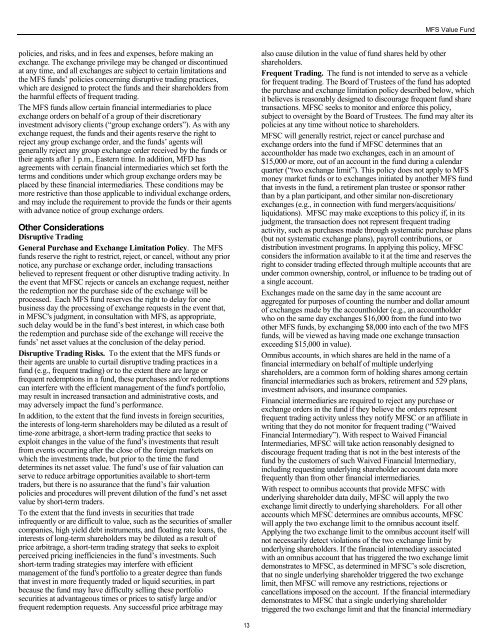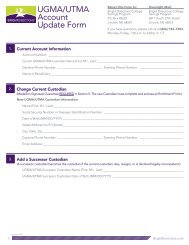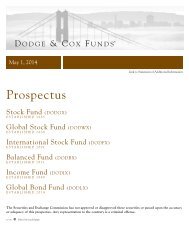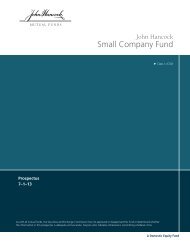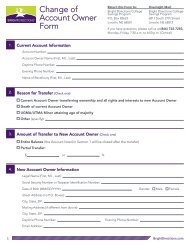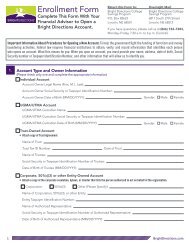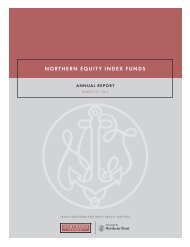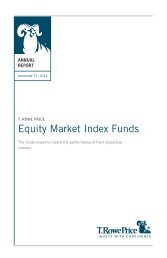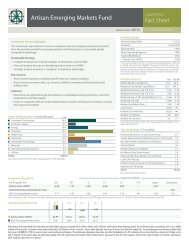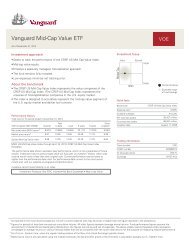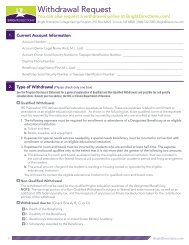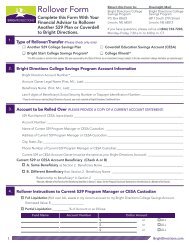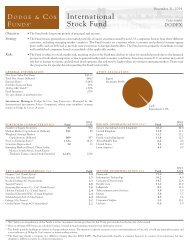EIF Prospectus - Bright Directions
EIF Prospectus - Bright Directions
EIF Prospectus - Bright Directions
You also want an ePaper? Increase the reach of your titles
YUMPU automatically turns print PDFs into web optimized ePapers that Google loves.
MFS Value Fund<br />
policies, and risks, and in fees and expenses, before making an<br />
exchange. The exchange privilege may be changed or discontinued<br />
at any time, and all exchanges are subject to certain limitations and<br />
the MFS funds‟ policies concerning disruptive trading practices,<br />
which are designed to protect the funds and their shareholders from<br />
the harmful effects of frequent trading.<br />
The MFS funds allow certain financial intermediaries to place<br />
exchange orders on behalf of a group of their discretionary<br />
investment advisory clients (“group exchange orders”). As with any<br />
exchange request, the funds and their agents reserve the right to<br />
reject any group exchange order, and the funds‟ agents will<br />
generally reject any group exchange order received by the funds or<br />
their agents after 1 p.m., Eastern time. In addition, MFD has<br />
agreements with certain financial intermediaries which set forth the<br />
terms and conditions under which group exchange orders may be<br />
placed by these financial intermediaries. These conditions may be<br />
more restrictive than those applicable to individual exchange orders,<br />
and may include the requirement to provide the funds or their agents<br />
with advance notice of group exchange orders.<br />
Other Considerations<br />
Disruptive Trading<br />
General Purchase and Exchange Limitation Policy. The MFS<br />
funds reserve the right to restrict, reject, or cancel, without any prior<br />
notice, any purchase or exchange order, including transactions<br />
believed to represent frequent or other disruptive trading activity. In<br />
the event that MFSC rejects or cancels an exchange request, neither<br />
the redemption nor the purchase side of the exchange will be<br />
processed. Each MFS fund reserves the right to delay for one<br />
business day the processing of exchange requests in the event that,<br />
in MFSC's judgment, in consultation with MFS, as appropriate,<br />
such delay would be in the fund‟s best interest, in which case both<br />
the redemption and purchase side of the exchange will receive the<br />
funds‟ net asset values at the conclusion of the delay period.<br />
Disruptive Trading Risks. To the extent that the MFS funds or<br />
their agents are unable to curtail disruptive trading practices in a<br />
fund (e.g., frequent trading) or to the extent there are large or<br />
frequent redemptions in a fund, these purchases and/or redemptions<br />
can interfere with the efficient management of the fund's portfolio,<br />
may result in increased transaction and administrative costs, and<br />
may adversely impact the fund‟s performance.<br />
In addition, to the extent that the fund invests in foreign securities,<br />
the interests of long-term shareholders may be diluted as a result of<br />
time-zone arbitrage, a short-term trading practice that seeks to<br />
exploit changes in the value of the fund‟s investments that result<br />
from events occurring after the close of the foreign markets on<br />
which the investments trade, but prior to the time the fund<br />
determines its net asset value. The fund‟s use of fair valuation can<br />
serve to reduce arbitrage opportunities available to short-term<br />
traders, but there is no assurance that the fund‟s fair valuation<br />
policies and procedures will prevent dilution of the fund‟s net asset<br />
value by short-term traders.<br />
To the extent that the fund invests in securities that trade<br />
infrequently or are difficult to value, such as the securities of smaller<br />
companies, high yield debt instruments, and floating rate loans, the<br />
interests of long-term shareholders may be diluted as a result of<br />
price arbitrage, a short-term trading strategy that seeks to exploit<br />
perceived pricing inefficiencies in the fund‟s investments. Such<br />
short-term trading strategies may interfere with efficient<br />
management of the fund's portfolio to a greater degree than funds<br />
that invest in more frequently traded or liquid securities, in part<br />
because the fund may have difficulty selling these portfolio<br />
securities at advantageous times or prices to satisfy large and/or<br />
frequent redemption requests. Any successful price arbitrage may<br />
also cause dilution in the value of fund shares held by other<br />
shareholders.<br />
Frequent Trading. The fund is not intended to serve as a vehicle<br />
for frequent trading. The Board of Trustees of the fund has adopted<br />
the purchase and exchange limitation policy described below, which<br />
it believes is reasonably designed to discourage frequent fund share<br />
transactions. MFSC seeks to monitor and enforce this policy,<br />
subject to oversight by the Board of Trustees. The fund may alter its<br />
policies at any time without notice to shareholders.<br />
MFSC will generally restrict, reject or cancel purchase and<br />
exchange orders into the fund if MFSC determines that an<br />
accountholder has made two exchanges, each in an amount of<br />
$15,000 or more, out of an account in the fund during a calendar<br />
quarter (“two exchange limit”). This policy does not apply to MFS<br />
money market funds or to exchanges initiated by another MFS fund<br />
that invests in the fund, a retirement plan trustee or sponsor rather<br />
than by a plan participant, and other similar non-discretionary<br />
exchanges (e.g., in connection with fund mergers/acquisitions/<br />
liquidations). MFSC may make exceptions to this policy if, in its<br />
judgment, the transaction does not represent frequent trading<br />
activity, such as purchases made through systematic purchase plans<br />
(but not systematic exchange plans), payroll contributions, or<br />
distribution investment programs. In applying this policy, MFSC<br />
considers the information available to it at the time and reserves the<br />
right to consider trading effected through multiple accounts that are<br />
under common ownership, control, or influence to be trading out of<br />
a single account.<br />
Exchanges made on the same day in the same account are<br />
aggregated for purposes of counting the number and dollar amount<br />
of exchanges made by the accountholder (e.g., an accountholder<br />
who on the same day exchanges $16,000 from the fund into two<br />
other MFS funds, by exchanging $8,000 into each of the two MFS<br />
funds, will be viewed as having made one exchange transaction<br />
exceeding $15,000 in value).<br />
Omnibus accounts, in which shares are held in the name of a<br />
financial intermediary on behalf of multiple underlying<br />
shareholders, are a common form of holding shares among certain<br />
financial intermediaries such as brokers, retirement and 529 plans,<br />
investment advisors, and insurance companies.<br />
Financial intermediaries are required to reject any purchase or<br />
exchange orders in the fund if they believe the orders represent<br />
frequent trading activity unless they notify MFSC or an affiliate in<br />
writing that they do not monitor for frequent trading (“Waived<br />
Financial Intermediary”). With respect to Waived Financial<br />
Intermediaries, MFSC will take action reasonably designed to<br />
discourage frequent trading that is not in the best interests of the<br />
fund by the customers of such Waived Financial Intermediary,<br />
including requesting underlying shareholder account data more<br />
frequently than from other financial intermediaries.<br />
With respect to omnibus accounts that provide MFSC with<br />
underlying shareholder data daily, MFSC will apply the two<br />
exchange limit directly to underlying shareholders. For all other<br />
accounts which MFSC determines are omnibus accounts, MFSC<br />
will apply the two exchange limit to the omnibus account itself.<br />
Applying the two exchange limit to the omnibus account itself will<br />
not necessarily detect violations of the two exchange limit by<br />
underlying shareholders. If the financial intermediary associated<br />
with an omnibus account that has triggered the two exchange limit<br />
demonstrates to MFSC, as determined in MFSC‟s sole discretion,<br />
that no single underlying shareholder triggered the two exchange<br />
limit, then MFSC will remove any restrictions, rejections or<br />
cancellations imposed on the account. If the financial intermediary<br />
demonstrates to MFSC that a single underlying shareholder<br />
triggered the two exchange limit and that the financial intermediary<br />
13


